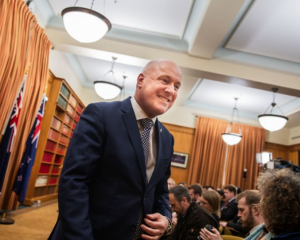The possibility of Government intervention was revealed on Monday, after a May 28 letter from Health Minister Jonathan Coleman to SDHB chairman Joe Butterfield was released publicly following media questions to the minister's office.
The board has until tomorrow to respond to the minister.
The end result would seem inevitable and the revelation comes as no real surprise.
Talk of a commissioner has been persistent, despite Dr Coleman's protestations to the contrary in April.
The list of problems facing the board is simply too big to ignore, as well as too difficult, it seems, for the current form of governance to make a real difference.
The word ''crisis'' has been used several times.
Recent documents revealed a board described by Labour's health spokeswoman, Annette King, as being in ''serious freefall'', posting years of multimillion-dollar deficits since the Otago and Southland boards were merged in 2010.
These include a projected $27 million deficit for 2014-15 and a forecasted deficit of up to $42 million for 2015-16.
Those figures are clearly unsustainable.
Add to that the likely $200 million-plus price tag to replace the ageing clinical services building (plus ongoing repairs) and the increasing demands related to an ageing population, and the task facing the board seems impossible on the current funding model.
The many thousands of health staff in the South have been trying hard to reduce costs and improve efficiency, and they deserve credit for that.
Many letters to this newspaper sing the praises of the caring staff at the coalface and the quality of the services provided.
Current and previous boards have tried to do the best they can given increasing demand, limited resources and relentless pressure from central government to reduce costs.
Their work is complex, tough and thankless, trying to balance public expectations and live within their means.
Boards haven't always got it right and some actions have affected public perception and central government confidence.
There have been years of issues reported by this newspaper related to infighting, morale, communication and transparency, and the legacy of the multimillion-dollar Michael Swann fraud lingers.
Dunedin Hospital's ''dated'' intensive care unit has lost its training accreditation.
The impact the loss of teaching and centralisation of services could have on the University of Otago's Dunedin School of Medicine is a concern.
There are fears - although disputed by the board - of a hospital downgrade.
And there are increasing fears in rural communities about the fate of their health services and hospitals.
It is right for the Government to ask whether the current management has been up to the enormity of the task, and to consider radical intervention if the answer is ''no''.
But the answer does not seem that simple.
Many argue the complex population-based funding model is increasingly unfair in the South, which has a small, elderly population scattered over a wide area, and which puts it on a different footing compared with many other boards.
The reality is the Government has also failed to make a difference, even though it appointed its own board chairman, two Crown monitors and implemented intensive monitoring by the National Health Board.
Its own health cost-cutting entity, Health Benefits Ltd, failed to make forecast savings nationwide, so it was wound up and responsibility for cost-cutting shifted to the health boards.
If the problem is simply governance alone, surely a solution would have been found by now?
Many will feel it is unfair to make board members the scapegoats and unfair to put staff and the public through more uncertainty when it appears the real issue is not being addressed.
However, if an open-minded person is appointed commissioner, and there is goodwill from staff and management, there is the possibility of resolving some issues and retaining services.
But the elephant in the room - population-based funding - must surely be properly addressed as a likely major cause of the board's woes.
Merely applying a sticking plaster that attends only to the symptoms is not conducive to the South's long-term health needs.












